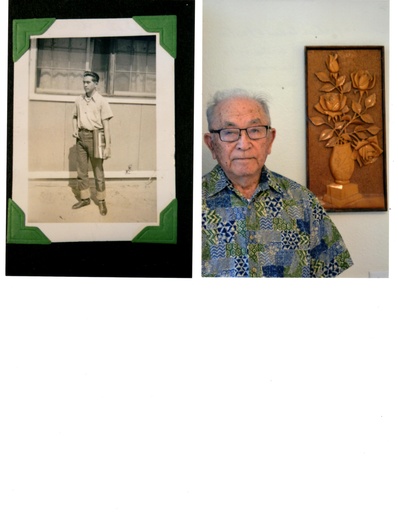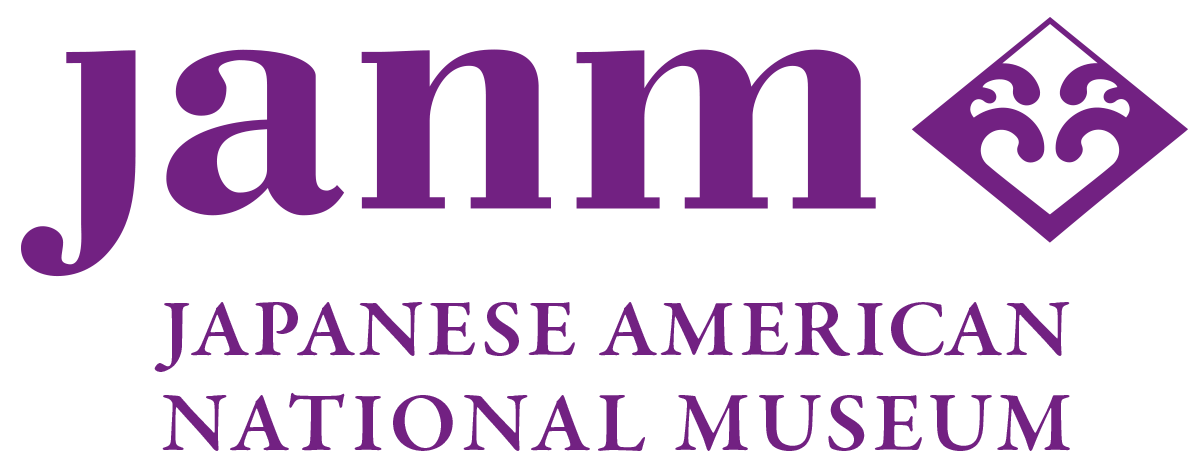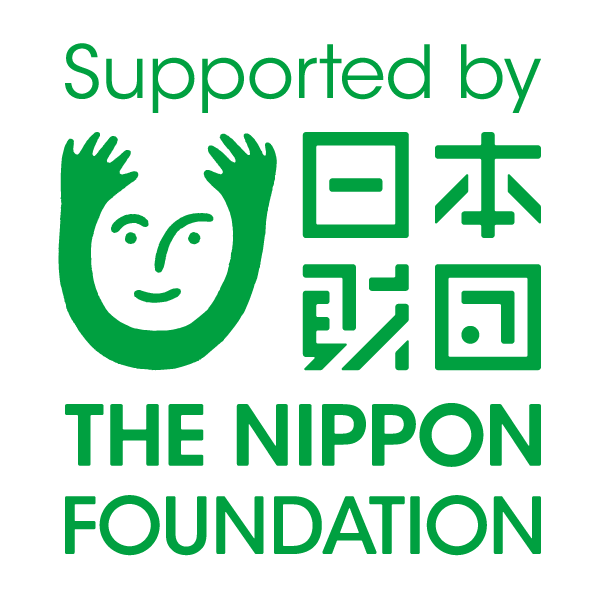

Amache Stories and Memories
 mhomma
mhomma
|

|
||
| Licensing | ||
Noboru Hashimoto, 7G-3D
Amache internee Noboru Hashimoto, 7G-3D, born in 1927. A photo at Amache and a color photo of his father woodwork while in Amache taken in 2016.
Nob said his dad learned to carve at Amache and this was his first carving! Future carvings got more sophisticated and other family members have those carvings. Nob said his dad never carved after he left Amache because he had to make a living, no time to woodwork.
FP Did your father learn to carve at Amache?
NH He learned to carve at Amache. I have a picture of the carving class at Amache, there's about 4-5 Issei I knew, I put their names on the back. I sent it to you yesterday. My father is not in the picture.
FP Why was Dana so interested in your father's carving, so she came all the way from Sonoma to see it and take a photo?
NH They were very good. He carved a lot: the vase of flowers, a crane, it got more and more sophisticaed. I don't have the real good ones, I don't who has it maybe my siblings. I ended up with a vase and a flower. He got better and better.
FP How did you get 300 acres of farm land?
NH Just build up, when my dad died, I inherited about 100 acres, just built on that. Ex Gi bill of rights, we were able to borrow $80,000 from State of California , at 3% interest. All the parents took advantage of this. This was right after the service. I was able to own the land in my name. One of the Nisei fellows, built a home with that money, they already had ranches. I used it to get acreage. You had to live on the property you bought, it became a hardship, because they already had a nice home and they didn't want to live on the property they bought. Back then we grew lot of peaches, almonds were just starting . Peaches took so much labor, and Caesar Chavez was geting busy out here and we wanted to get away from that. Almonds can be mechanized, it took a lot of money to get the equipment.
The county grows mostly sweet potatoes and almonds. it's a big industry, 80%, goes overseas - people get mad because of the water shortage. Almonds use aso much water, but 80% go over seas Causes a little conflict because mostly the cities told people not to water the lawn or wash their cars, because water was for farming - put in cactus instead of flowers, people were mad about these so water could be used to grow almonds, which were mainly sent overseas.
FP Tell me about all the vegetables grown at Amache so it could be shared with other camps.
Was Amache paid for the vegetables or did the US Government just take the crop and send it to other camps?
NH Amache grew vegetables. Issei ladies and men and older Nisei were just sitting around so they worked on the farm - the land belonged to the camp. They had a lot of acres, they were supposed to grow vegetables for camp, they had surplus to send to other camps. They even made tea because they couldn't get Japanese tea, they grew their own tea - they grew other things the locals said couldn't grow here. But they were good farmers and they could grow anything. I gave the book to UC Merced, that was all written in that. I miss the year books I gave to the UC Merced, because it has all my friends in there. The goverment bought a lot of land from local people, shoved them off, for camp to grow vegetables. They also raised cattle - they bought the land cheap, government just took the land and did not pay a high price, used eminent domain. The local people they took the land from were not happy about it -
They shipped a lot of food outside, eventually they wanted a lot grown locally. They had a lot of good farmers in camp who had nothing to do, paid them a little, but they farmed. Weekends asked volunters to harvest because you need a lot of labor. Toward end of Camp, they didn't have enough laborers to haul coal for heating in camp, asked volunteers to unload the railroad cars andI remember I dumped coal into a dump truck. I was a teen,my dad, too. They made you work, because otherwise wouldn't have heat.
My father was carving, shogi, and goh - not working, they asked him to work on the garbage detail because no one was going to do it. So he had to work on the garbage - low pay $16 month. My mother was kitchen helper, KP, got $12 monthly. I washed dishes, we hauled the trays of dishes to ladies and they wiped it as KP work. They paid about $12 minimum a month.
FP You wrote that you were a member of the Future Farmers of America (FFA), and raised hogs and cattle at Amache.
NH The teens from FFA, raised the hogs and cattle; went to school morning to noon, then afternoon, we'd feed alfalfa to cows, they had a slaughter house to make meat for camp. They had a pig farm - I think they had chicken farm and eggs - they had pretty big acreage, I never saw it all. We worked all afternoon
FP Who taught you about hog and cattle raising?
NH A high school teacher, a white teacher. There were two of them; there was a morning group, that worked in the morning and went to school in afternoon. In winter time, we irrigated the land, ready to mow the alfalfa,rake and stack it up,then feed the cattle. It was mostly beef , meat for camp. I remember we had steak once - most of it was chopped for okazu with vegetables.
FP Do you rememaber squid? I remember at age 2-4, my mother said I couldn't see the movies,if I didn't eat the squid. It was the rubbery thing and fresh.
NH No, don't remember squid. There was a fish market in Granada, a man who lived there set up a fish market - but he did't have enough business - not enough for mess hall. This man lived in Granada, not in Amache. There was a taxi seravice in Granada, with service to Amache camp. A group of us, we forgot what it's like to ride in a car - we walked to Granada, pooled our money and got a ride to Amache in a taxi just to get a ride in a car! Some of us had cars, but after a couple of years, you forget what it's like to ride in a car. Everybody was in gangs, the LA people were in gangs - hung out.
FP Do you know Min Tonai? He was a teen at Amache and says he didn't own a zoot suit although some of the farm country teens said he did.
NH There were boys who dressed up in zoot suits from LA - some dressed up for Sunday. In LA, they were beating up Mexicans and African Americans, the sailors fromthe boats would go beat up these minorities in zoot suits - we were afraid of them because they were gangs- from East LA.
FP What was the big fire you mentioned before going to camp?
NH We burned anything we wanted to, could burn any time, you can't do that now. We sold all our household things but there were lots of things we couldn't take: mattresses, furniture, piano - they offered $35 for it; - I wanted to burn it, but my father said we can take $35 in our pocket, so he sold it. A lot of people wanted bargains - they were big nosed people, I sure got to hate them for buyig things next to nothing. They took advantage of it, what we didn't sell, we burned like the kendo equipment,like the bamboo staves, - we all had outhouses in the country - now days you can't burn, you have to shred it. I had to shred a whole bunch of records b/c for 60 years you had to keep receipts when you bought things, you had to show the sheriff you bought it . We kept all those receipts. we had tons of paper we had to shred.
Based on this original

|
Noboru Hashimoto, 7G-3D |
 Amache Stories and Memories
Amache Stories and Memories The Schmoe House, Houses for Hiroshima Project, Grand Opening Ceremony - Hiroshima, Japan
The Schmoe House, Houses for Hiroshima Project, Grand Opening Ceremony - Hiroshima, Japan May 2011 Japan Tsunami Relief Mission trip & Follow up visit in Oct 2012
May 2011 Japan Tsunami Relief Mission trip & Follow up visit in Oct 2012 Baptist Churches in Pre-WWII Imperial Japan
Baptist Churches in Pre-WWII Imperial Japan Moneta / Gardena Valley Baptist Church (1930-1940)
Moneta / Gardena Valley Baptist Church (1930-1940) Heart Mountain Photos from Michihiko Wada
Heart Mountain Photos from Michihiko Wada Incarceration Years: Lordsburg/Santa Fe, Seagoville, Amache Camp Photos and DOJ Documents
Incarceration Years: Lordsburg/Santa Fe, Seagoville, Amache Camp Photos and DOJ Documents
 Journal feed
Journal feed
